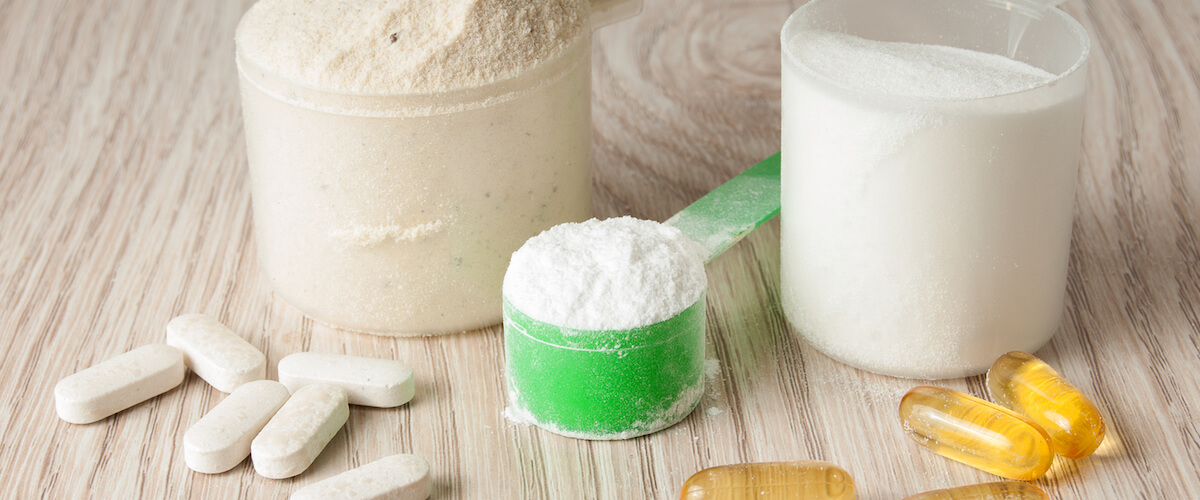BCAAs & Ergogenic Aid Effects?
Insulin and BCAA have been shown to be anabolic compounds via their augmentation of translation initiation when secreted or ingested before, during, or immediately after an acute resistance exercise (RE) bout. During prolonged aerobic endurance exercise, muscle glycogen may become depleted and the muscle may increase its reliance on BCAA for fuel. BCAA supplementation has been studied for its effects on.....various types of exercise performance, including ratings of perceived exertion (RPE) during exercise and mental performance following exercise as well as results of body composition changes over a period of time.
In general, the findings are equivocal, as are the conclusions from several recent reviews. One investigator concluded that BCAA supplementation reduces RPE and mental fatigue during prolonged exercise and improves cognitive performance after exercise, and also suggests that in some situations BCAA supplementation may improve physical performance, such as during exercise in the heat or in actual competitive races where central fatigue may be more pronounced than in laboratory experiments1. Another study that evaluated 36 trained males found that 8-weeks supplementing with BCAAs increased lean mass while decreasing body fat2. However, in a similar study with 20 recreationally active males, similar results on serum levels were not found3. This may be due to the difference between BCAAs results following an 8-week protocol as opposed to a single measurable result. Although current research does not support an ergogenic effect of BCAA supplementation, most investigators recommend additional research. A randomized, double-blind study was performed to evaluate the efficacy of consuming a supplement containing branched-chain amino acids (BCAAs) during an eight-week resistance-training program. Thirty-six strength-trained males with a minimum of two years resistance-training experience (25.5 yrs, 177.7 cm, 85.2 kg and 9.3% body fat) were randomly assigned to receive either 14 grams of BCAAs (n = 12), 28 grams of whey protein (n = 12), or 28 grams of carbohydrates from a sports drink (n = 12) while performing an eight-week resistance-training program. Participants followed a periodized, whole-body training program that involved training all major muscle groups once per week using a four-day training split. Subjects body weight, body composition, and 10-rep max on the bench press and squat were determined before and after the eight-week training program. Subjects followed a standardized diet while following the program. Ingestion of a supplement containing BCAAs while following an 8-week resistance training program resulted in a greater decrease in percent body fat, an increase in lean mass, and 10-RM strength gains on the bench press and squat vs. ingestion of a whey supplement or a sports drink.
In addition, the ingestion of a whey protein supplement resulted in greater lean mass gains than ingestion of a sports drink2. In another randomized, double blind, placebo controlled design, 20 recreationally active males (22.7 ± 3.9 yrs; 177.1 ± 7.3 cm; 83.9 ± 11.5 kg) ingested either 120 mg/kg of BCAA (n = 10) divided into 3 equal doses or a placebo (n = 10) in conjunction with a lower body RE bout. The RE bout consisted of 4 sets of leg press at 80% of 1 RM to failure followed by 4 sets of knee extension at 80% 1 RM to failure. Rest periods between sets and exercises were 150 seconds. Supplementation was administered 30 minutes prior, immediately before, and immediately following RE. Serum insulin was obtained at baseline, 30 minutes after the first supplementation administration, as well as immediately post, 30 min, 2 hr, and 6 hr post RE. Serum insulin was analyzed via ELISA (Alpha Diagnostic Intl.). Insulin data were analyzed using SPSS for Windows version 15.0. A 2 × 6 repeated measures ANOVA (mixed methods) with repeated measures on the second factor (time) was utilized3. At a dosage of 120 mg/kg of bodyweight, it appears that BCAA supplementation does not increase serum insulin values to a greater extent than an acute bout of resistance exercise alone. In conclusion, BCAA's may show more promise as an ergogenic aid in studies where the tests are longer and show progression. They may not have as much effect on 1RM as they do on recovery over time.
by Evolution Nutrition
References
1. Blomstrand E. Amino acids and central fatigue. Amino Acids. 2001, 20:25-34. 2. Stoppani, J., Scheet, T., Pena, J., Rudolph, C., Charlebois, D. Consuming a supplement containing branched-chain amino acids during a resistance-training program increases lean mass, muscle strength and fat loss. Journal of the International Society of Sports Nutrition. 2009, 6(Suppl 1):P1. 3. Oetken, A., Campbell, B., La Bounty, P., and Willoughby, D. The effect of BCAA supplementation on serum insulin secretion before, during, and following a lower-body resistance exercise bout. Journal of the International Society of Sports Nutrition. 2008, 5(Suppl 1):P20.

